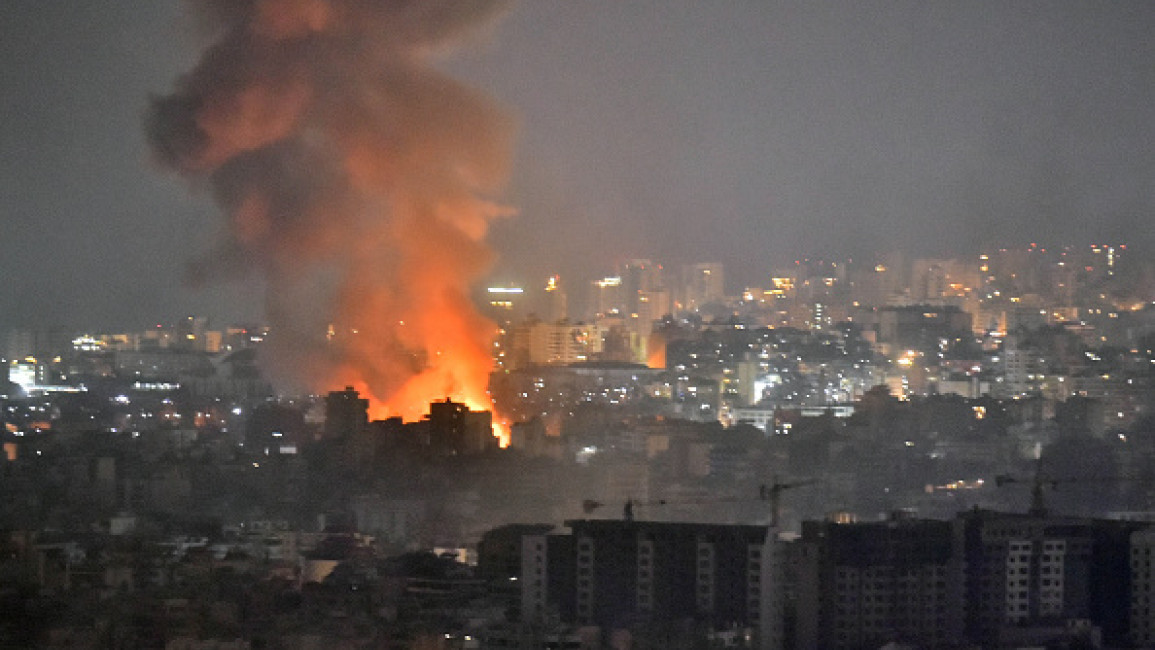Over three-quarters of Lebanon's districts have been bombed by Israel in past three weeks
More than 75 percent of Lebanon's districts have come under Israeli bombardment since a ferocious air campaign was launched on the country, particularly the south, three and a half weeks ago.
Since 23 September, 20 of Lebanon's 26 districts have been bombed, including areas not targeted in decades and far from the frontlines.
Israel's initial attacks since 7 October 2023 were centred on the south, while parts of the Western Beqaa and southern Beirut's Dahiyeh have also witnessed deadly aerial assaults. Israeli attacks have now expanded deeper into Lebanese territory, including districts with no historical association with Hezbollah – with just six districts remaining unscathed as of Wednesday during a sharp rise in bombardments over the past three weeks.
"Safety in Lebanon has become a relative concept – no one knows how the Israeli enemy is selecting the places it is attacking, or the flimsy excuses it will use," Sidon's MP Abdul Rahman Bizri told Al-Araby Al-Jadeed, The New Arab's Arabic-language sister edition.
He added that Israel's massacre in Aitou, in the northern Zgharta district, on Monday and in Nabatieh on Wednesday, showed it was expanding its zone of fire.
As of Wednesday, the following districts have come under Israeli bombardment: Sidon, Jezzine, Tyre (in the South Governorate), Nabatieh, Marjeyoun, Hasbaya, Bint Jbeil (Nabatieh governorate), Zahle, West Beqaa, Rashaya (Beqaa governorate), Baalbek, Hermel (Baalbek-Hermel Governorate), Beirut (Beirut Governorate), Chouf, Aley, Baabda, Keserwan, Jbeil (Mount Lebanon governorate), Batroun and Zgharta (North Governorate).
Akkar (Akkar governorate), Miniyeh-Danniyeh, Tripoli, Koura, Bsharri (in North Governorate), and Metn (Mount Lebanon governorate) are the six that have so far not come under Israeli fire.
The districts that have so far been spared attack are predominantly those in the northwest of the country, with the Syrian coast to the north.
Meanwhile, the border crossings in the east and northeast of Lebanon into Syria have been decimated by Israeli airstrikes.
Since 23 September, Israel has expanded its circle of targets by launching attacks on areas sheltering those displaced from the south, the Beqaa, and Dahiyeh – the vast majority of whom hail from Lebanon's Shia community.
Israel has also raided Maaysrah village (Keserwan district) several times, most recently last Saturday. Ras Osta, a village in Jbeil was targeted on 25 September. Both are Shia-majority villages surrounded by Christian villages.
But the attacks have not been limited to Lebanon's Shia community. On 27 September, Baadaran area of Chouf, a Druze-majority area, where many displaced Lebanese had fled to, was heavily bombed.
Israel also targeted the road from Ainata-Al Ariz to Baalbek on 30 September, as well as a site for the displaced in Deir Bella in Batroun district on 12 October – two Christian majority areas.
Bizri said recent developments proved that Israel's aggression was now "aimed at the whole of Lebanon, and is no longer targeting just one category, group or region".
He predicted that the bombardment would escalate in pace and brutality due to Israel's past behaviour, its aerial advantage, and because "despite the crimes it has committed it seems untouchable and immune to international condemnation".
Bizri added that "the enemy is trying to weaken the home front, which has shown itself on a popular level to be united in solidarity, largely, unlike on the political level".
By bombing areas hosting the displaced, Bizri pointed out that Israel is hoping to drive division among the Lebanese people as well as throw them into disarray.
He said he supported Lebanon's caretaker Prime Minister Najib Mikati's diplomatic efforts and urged him to "focus on the safety of all citizens" and to seek effective guarantees "encompassing all the Lebanese regions".
This article is based on an article which appeared in our Arabic edition by Rita Jammal and Pierre Akiki on October 17 2024. To read the original article click here.




 Follow the Middle East's top stories in English at The New Arab on Google News
Follow the Middle East's top stories in English at The New Arab on Google News
![A group of Palestinians, foreign and Israeli activists gather to participated in an olive picking event on the land in the town of Battir, which is under threat of confiscation by Israel in Bethlehem, occupied West Bank on 8 November 2024. [Getty]](/sites/default/files/styles/image_330x185/public/2182930803.jpeg?h=199d8c1f&itok=__0LgGsa)

![People gathered around the rubble of destroyed houses to search for survivors [Getty]](/sites/default/files/styles/image_330x185/public/2024-11/GettyImages-2184733820.jpg?h=199d8c1f&itok=NiM1LO2f)